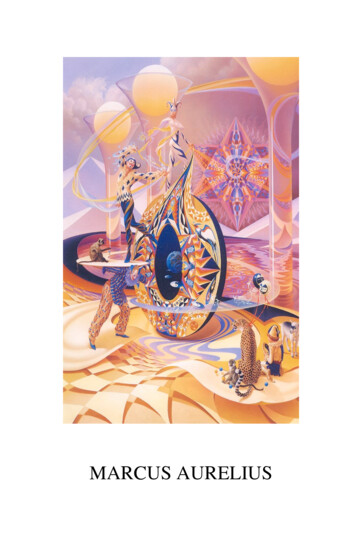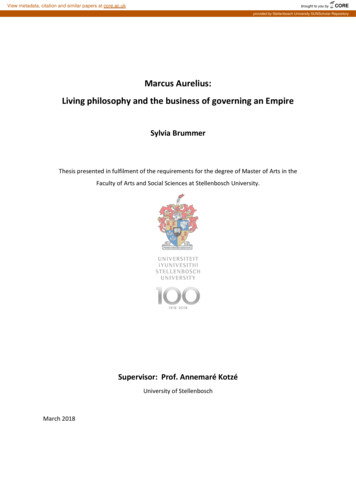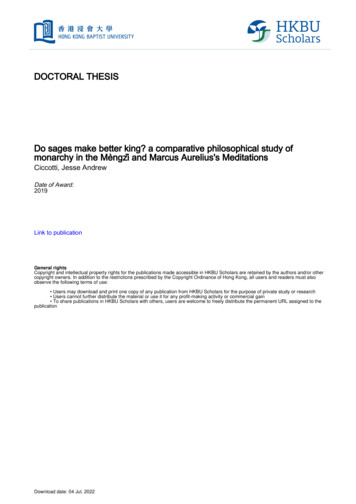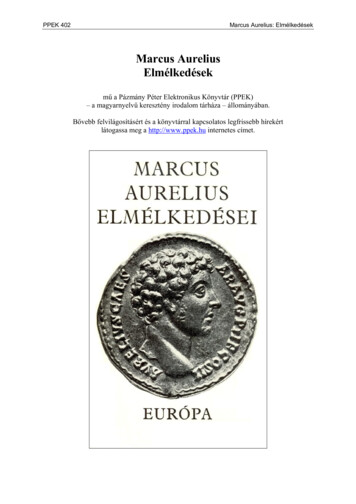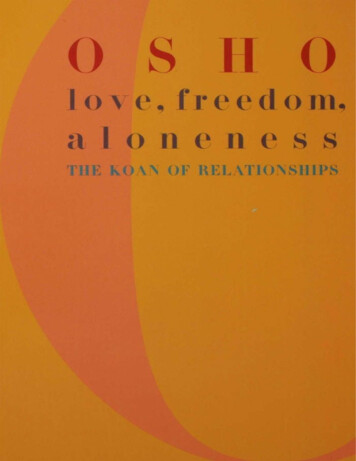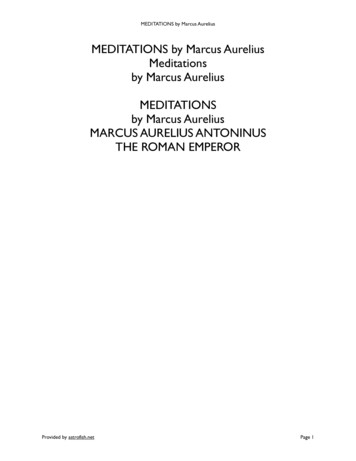
Transcription
MEDITATIONS by Marcus AureliusMEDITATIONS by Marcus AureliusMeditationsby Marcus AureliusMEDITATIONby Marcus AureliusMARCUS AURELIUS ANTONINUTHE ROMAN EMPEROSPage 1RSProvided by astrofish.net
MEDITATIONS by Marcus AureliusMEDITATIONS by Marcus AureliuTHE FIRST BOOK3THE SECOND BOOK13THE THIRD BOOK19THE FOURTH BOOK28THE FIFTH BOOK42THE SIXTH BOOK56SEVENTH BOOK70THE EIGHTH BOOK85100THE TENTH BOOK114THE ELEVENTH BOOK129THE TWELFTH BOOK141Provided by astrofish.netPage 2sTHE NINTH BOOK
MEDITATIONS by Marcus AureliusTHE FIRST BOOKI. Of my grandfather Verus I have learned to be gentle and meek, and torefrain from all anger and passion. From the fame and memory of himthat begot me I have learned both shamefastness and manlike behaviour.Of my mother I have learned to be religious, and bountiful; and toforbear,not only to do, but to intend any evil; to content myself with a sparediet, and to fly all such excess as is incidental to great wealth. Of mygreat-grandfather, both to frequent public schools and auditories, and toget me good and able teachers at home; and that I ought not to thinkmuch, if upon such occasions, I were at excessive charges.II. Of him that brought me up, not to be fondly addicted to either of thetwo great factions of the coursers in the circus, called Prasini, and Veneti:nor in the amphitheatre partially to favour any of the gladiators, orfencers, as either the Parmularii, or the Secutores. Moreover, to endurelabour; nor to need many things; when I have anything to do, to do itmyself rather than by others; not to meddle with many businesses; andnot easily to admit of any slander.III. Of Diognetus, not to busy myself about vain things, and not easily tobelieve those things, which are commonly spoken, by such as take uponthem to work wonders, and by sorcerers, or prestidigitators, andimpostors; concerning the power of charms, and their driving out ofdemons, or evil spirits; and the like. Not to keep quails for the game; norto be mad after such things. Not to be offended with other men'sliberty of speech, and to apply myself unto philosophy. Him also I mustthank, that ever I heard first Bacchius, then Tandasis and Marcianus, andthat I did write dialogues in my youth; and that I took liking to thephilosophers' little couch and skins, and such other things, which by theGrecian discipline are proper to those who profess philosophy.IV.To Rusticus I am beholding, that I first entered into the conceit thatmy life wanted some redress and cure.And then, that I did not fall intothe ambition of ordinary sophists, either to write tracts concerning thecommon theorems, or to exhort men unto virtue and the study ofProvided by astrofish.netPage 3
MEDITATIONS by Marcus Aureliusphilosophy by public orations; as also that I never by way of ostentationdid affect to show myself an active able man, for any kind of bodilyexercises.And that I gave over the study of rhetoric and poetry, and ofelegant neat language.That I did not use to walk about the house in mylong robe, nor to do any such things. Moreover I learned of him towrite letters without any affectation, or curiosity; such as that was,which by him was written to my mother from Sinuessa: and to be easyand ready to be reconciled, and well pleased again with them that hadoffended me, as soon as any of them would be content to seek unto meagain.To read with diligence; not to rest satisfied with a light andsuperficial knowledge, nor quickly to assent to things commonly spokenof: whom also I must thank that ever I lighted upon Epictetus hisHypomnemata, or moral commentaries and common-factions: whichalso he gave me of his own.V. From Apollonius, true liberty, and unvariable steadfastness, and not toregard anything at all, though never so little, but right and reason: andalways, whether in the sharpest pains, or after the loss of a child, or inlong diseases, to be still the same man; who also was a present andvisible example unto me, that it was possible for the same man to beboth vehement and remiss: a man not subject to be vexed, and offendedwith the incapacity of his scholars and auditors in his lectures andexpositions; and a true pattern of a man who of all his good gifts andfaculties, least esteemed in himself, that his excellent skill and ability toteach and persuade others the common theorems and maxims of theStoic philosophy. Of him also I learned how to receive favours andkindnesses (as commonly they are accounted:) from friends, so that Imight not become obnoxious unto them, for them, nor more yieldingupon occasion, than in right I ought; and yet so that I should not passthem neither, as an unsensible and unthankful man.VI. Of Sextus, mildness and the pattern of a family governed withpaternal affection; and a purpose to live according to nature: to be gravewithout affectation: to observe carefully the several dispositions of myfriends, not to be offended with idiots, nor unseasonably to set uponProvided by astrofish.netPage 4
MEDITATIONS by Marcus Aureliusthose that are carried with the vulgar opinions, with the theorems, andtenets of philosophers: his conversation being an example how a manmight accommodate himself to all men and companies; so that thoughhis company were sweeter and more pleasing than any flatterer'scogging and fawning; yet was it at the same time most respected andreverenced: who also had a proper happiness and faculty, rationally andmethodically to find out, and set in order all necessary determinationsand instructions for a man's life.A man without ever the leastappearance of anger, or any other passion; able at the same time mostexactly to observe the Stoic Apathia, or unpassionateness, and yet to bemost tender-hearted: ever of good credit; and yet almost without anynoise, or rumour: very learned, and yet making little show.VII. From Alexander the Grammarian, to be un-reprovable myself, andnot reproachfully to reprehend any man for a barbarism, or a solecism,or any false pronunciation, but dextrously by way of answer, ortestimony, or confirmation of the same matter (taking no notice of theword) to utter it as it should have been spoken; or by some other suchclose and indirect admonition, handsomely and civilly to tell him of it.VIII. Of Fronto, to how much envy and fraud and hypocrisy the state ofa tyrannous king is subject unto, and how they who are commonlycalled [Eupatridas Gk.], i.e. nobly born, are in some sort incapable, orvoid of natural affection.IX. Of Alexander the Platonic, not often nor without great necessity toProvided by say, or to write to any man in a letter, 'I am not at leisure'; norin this manner still to put off those duties, which we owe to our friendsand acquaintances (to every one in his kind) under pretence of urgentaffairs.X. Of Catulus, not to contemn any friend's expostulation, though unjust,but to strive to reduce him to his former disposition: freely and heartilyto speak well of all my masters upon any occasion, as it is reported ofDomitius, and Athenodotus: and to love my children with true affection.XI. From my brother Severus, to be kind and loving to all them of myhouse and family; by whom also I came to the knowledge of Thrasea andProvided by astrofish.netPage 5
MEDITATIONS by Marcus AureliusHelvidius, and Cato, and Dio, and Brutus. He it was also that did put mein the first conceit and desire of an equal commonwealth, administeredby justice and equality; and of a kingdom wherein should be regardednothing more than the good and welfare of the subjects. Of him also,to observe a constant tenor, (not interrupted, with any other cares anddistractions,) in the study and esteem of philosophy: to be bountiful andliberal in the largest measure; always to hope the best; and to beconfident that my friends love me. In whom I moreover observed opendealing towards those whom he reproved at any time, and that hisfriends might without all doubt or much observation know what hewould, or would not, so open and plain was he.XII. From Claudius Maximus, in all things to endeavour to have power ofmyself, and in nothing to be carried about; to be cheerful andcourageous in all sudden chances and accidents, as in sicknesses: to lovemildness, and moderation, and gravity: and to do my business,whatsoever it be, thoroughly, and without querulousness.Whatsoeverhe said, all men believed him that as he spake, so he thought, andwhatsoever he did, that he did it with a good intent. His manner was,never to wonder at anything; never to be in haste, and yet never slow:nor to be perplexed, or dejected, or at any time unseemly, orexcessively to laugh: nor to be angry, or suspicious, but ever ready to dogood, and to forgive, and to speak truth; and all this, as one that seemedrather of himself to have been straight and right, than ever to have beenrectified or redressed; neither was there any man that ever thoughthimself undervalued by him, or that could find in his heart, to thinkhimself a better man than he. He would also be very pleasant andgracious.XIII. In my father, I observed his meekness; his constancy withoutwavering in those things, which after a due examination anddeliberation, he had determined. How free from all vanity he carriedhimself in matter of honour and dignity, (as they are esteemed:) hislaboriousness and assiduity, his readiness to hear any man, that hadaught to say tending to any common good: how generally and impartiallyProvided by astrofish.netPage 6
MEDITATIONS by Marcus Aureliushe would give every man his due; his skill and knowledge, when rigouror extremity, or when remissness or moderation was in season; how hedid abstain from all unchaste love of youths; his moderatecondescending to other men's occasions as an ordinary man, neitherabsolutely requiring of his friends, that they should wait upon him at hisordinary meals, nor that they should of necessity accompany him in hisjourneys; and that whensoever any business upon some necessaryoccasions was to be put off and omitted before it could be ended, hewas ever found when he went about it again, the same man that he wasbefore. His accurate examination of things in consultations, and patienthearing of others. He would not hastily give over the search of thematter, as one easy to be satisfied with sudden notions andapprehensions. His care to preserve his friends; how neither at any timehe would carry himself towards them with disdainful neglect, and growweary of them; nor yet at any time be madly fond of them. Hiscontented mind in all things, his cheerful countenance, his care toforesee things afar off, and to take order for the least, without any noiseor clamour. Moreover how all acclamations and flattery were repressedby him: how carefully he observed all things necessary to thegovernment, and kept an account of the common expenses, and howpatiently he did abide that he was reprehended by some for this hisstrict and rigid kind of dealing. How he was neither a superstitiousworshipper of the gods, nor an ambitious pleaser of men, or studious ofpopular applause; but sober in all things, and everywhere observant ofthat which was fitting; no affecter of novelties: in those things whichconduced to his ease and convenience, (plenty whereof his fortune didafford him,) without pride and bragging, yet with all freedom and liberty:so that as he did freely enjoy them without any anxiety or affectationwhen they were present; so when absent, he found no want of them.Moreover, that he was never commended by any man, as either alearned acute man, or an obsequious officious man, or a fine orator; butas a ripe mature man, a perfect sound man; one that could not endureto be flattered; able to govern both himself and others. Moreover, howmuch he did honour all true philosophers, without upbraiding thoseProvided by astrofish.netPage 7
MEDITATIONS by Marcus Aureliusthat were not so; his sociableness, his gracious and delightfulconversation, but never unto satiety; his care of his body within boundsand measure, not as one that desired to live long, or over-studious ofneatness, and elegancy; and yet not as one that did not regard it: so thatthrough his own care and providence, he seldom needed any inwardphysic, or outward applications: but especially how ingeniously he wouldyield to any that had obtained any peculiar faculty, as either eloquence,or the knowledge of the laws, or of ancient customs, or the like; andhow he concurred with them, in his best care and endeavour that everyone of them might in his kind, for that wherein he excelled, be regardedand esteemed: and although he did all things carefully after the ancientcustoms of his forefathers, yet even of this was he not desirous thatmen should take notice, that he did imitate ancient customs.Again, howhe was not easily moved and tossed up and down, but loved to beconstant, both in the same places and businesses; and how after hisgreat fits of headache he would return fresh and vigorous to his wontedaffairs. Again, that secrets he neither had many, nor often, and such onlyas concerned public matters: his discretion and moderation, in exhibitingof the public sights and shows for the pleasure and pastime of thepeople: in public buildings. congiaries, and the like. In all these things,having a respect unto men only as men, and to the equity of the thingsthemselves, and not unto the glory that might follow. Never wont to usethe baths at unseasonable hours; no builder; never curious, or solicitous,either about his meat, or about the workmanship, or colour of hisclothes, or about anything that belonged to external beauty.In all his conversation, far from all inhumanity, all boldness, and incivility,all greediness and impetuosity; never doing anything with suchearnestness, and intention, that a man could say of him, that he didsweat about it: but contrariwise, all things distinctly, as at leisure;without trouble; orderly, soundly, and agreeably. A man might haveapplied that to him, which is recorded of Socrates, that he knew how towant, and to enjoy those things, in the want whereof, most men showthemselves weak; and in the fruition, intemperate: but to hold out firmProvided by astrofish.netPage 8
MEDITATIONS by Marcus Aureliusand constant, and to keep within the compass of true moderation andsobriety in either estate, is proper to a man, who hath a perfect andinvincible soul; such as he showed himself in the sickness of Maximus.XIV. From the gods I received that I had good grandfathers, and parents,a good sister, good masters, good domestics, loving kinsmen, almost allthat I have; and that I never through haste and rashness transgressedagainst any of them, notwithstanding that my disposition was such, asthat such a thing (if occasion had been) might very well have beencommitted by me, but that It was the mercy of the gods, to preventsuch a concurring of matters and occasions, as might make me to incurthis blame.That I was not long brought up by the concubine of myfather; that I preserved the flower of my youth.That I took not upon meto be a man before my time, but rather put it off longer than Ineeded.That I lived under the government of my lord and father, whowould take away from me all pride and vainglory, and reduce me to thatconceit and opinion that it was not impossible for a prince to live in thecourt without a troop of guards and followers, extraordinary apparel,such and such torches and statues, and other like particulars of stateand magnificence; but that a man may reduce and contract himselfalmost to the state of a private man, and yet for all that not to becomethe more base and remiss in those public matters and affairs, whereinpower and authority is requisite.That I have had such a brother, who byhis own example might stir me up to think of myself; and by his respectand love, delight and please me.That I have got ingenuous children, andthat they were not born distorted, nor with any other natural deformity.That I was no great proficient in the study of rhetoric and poetry, and ofother faculties, which perchance I might have dwelt upon, if I had foundmyself to go on in them with success.That I did by times prefer those,by whom I was brought up, to such places and dignities, which theyseemed unto me most to desire; and that I did not put them off withhope and expectation, that (since that they were yet but young) I woulddo the same hereafter.That I ever knew Apollonius and Rusticus, andMaximus.That I have had occasion often and effectually to consider andProvided by astrofish.netPage 9
MEDITATIONS by Marcus Aureliusmeditate with myself, concerning that life which is according to nature,what the nature and manner of it is: so that as for the gods and suchsuggestions, helps and inspirations, as might be expected from them,nothing did hinder, but that I might have begun long before to liveaccording to nature; or that even now that I was not yet partaker and inpresent possession of that life, that I myself (in that I did not observethose inward motions, and suggestions, yea and almost plain andapparent instructions and admonitions of the gods,) was the only causeof it.That my body in such a life, hath been able to hold out so long. ThatI never had to do with Benedicta and Theodotus, yea and afterwardswhen I fell into some fits of love, I was soon cured.That having beenoften displeased with Rusticus, I never did him anything for whichafterwards I had occasion to repent.That it being so that my motherwas to die young, yet she lived with me all her latter years.That as oftenas I had a purpose to help and succour any that either were poor, orfallen into some present necessity, I never was answered by my officersthat there was not ready money enough to do it; and that I myself neverhad occasion to require the like succour from any other.That I havesuch a wife, so obedient, so loving, so ingenuous.That I had choice of fitand able men, to whom I might commit the bringing up of my children.That by dreams I have received help, as for other things, so in particular,how I might stay my casting of blood, and cure my dizziness, as that alsothat happened to thee in Cajeta, as unto Chryses when he prayed bythe seashore.And when I did first apply myself to philosophy, that I didnot fall into the hands of some sophists, or spent my time either inreading the manifold volumes of ordinary philosophers, nor in practisingmyself in the solution of arguments and fallacies, nor dwelt upon thestudies of the meteors, and other natural curiosities. All these thingswithout the assistance of the gods, and fortune, could not have been.XV. In the country of the Quadi at Granua, these. Betimes in themorning say to thyself,This day I shalt have to do with an idle curiousman, with an unthankful man, a railer, a crafty, false, or an envious man;an unsociable uncharitable man.All these ill qualities have happenedProvided by astrofish.netPage 10
MEDITATIONS by Marcus Aureliusunto them, through ignorance of that which is truly good and truly bad.But I that understand the nature of that which is good, that it only is tobe desired, and of that which is bad, that it only is truly odious andshameful: who know moreover, that this transgressor, whosoever he be,is my kinsman, not by the same blood and seed, but by participation ofthe same reason, and of the same divine particle; How can I either behurt by any of those, since it is not in their power to make me incuranything that is truly reproachful? or angry, and ill affected towards him,who by nature is so near unto me? for we are all born to be fellowworkers, as the feet, the hands, and the eyelids; as the rows of the upperand under teeth: for such therefore to be in opposition, is againstnature; and what is it to chafe at, and to be averse from, but to be inopposition?XVI.Whatsoever I am, is either flesh, or life, or that which we commonlycall the mistress and overruling part of man; reason.Away with thybooks, suffer not thy mind any more to be distracted, and carried to andfro; for it will not be; but as even now ready to die, think little of thyflesh: blood, bones, and a skin; a pretty piece of knit and twisted work,consisting of nerves, veins and arteries; think no more of it, than so.Andas for thy life, consider what it is; a wind; not one constant wind neither,but every moment of an hour let out, and sucked in again.The third, isthy ruling part; and here consider;Thou art an old man; suffer not thatexcellent part to be brought in subjection, and to become slavish: sufferit not to be drawn up and down with unreasonable and unsociable lustsand motions, as it were with wires and nerves; suffer it not any more,either to repine at anything now present, or to fear and fly anything tocome, which the destiny hath appointed thee.XVII.Whatsoever proceeds from the gods immediately, that any manwill grant totally depends from their divine providence.As for thosethings that are commonly said to happen by fortune, even those mustbe conceived to have dependence from nature, or from that first andgeneral connection, and concatenation of all those things, which morePage 11Provided by astrofish.net
MEDITATIONS by Marcus Aureliusapparently by the divine providence are administered and brought topass.All things flow from thence: and whatsoever it is that is, is bothnecessary, and conducing to the whole (part of which thou art), andwhatsoever it is that is requisite and necessary for the preservation ofthe general, must of necessity for every particular nature, be good andbehoveful.And as for the whole, it is preserved, as by the perpetualmutation and conversion of the simple elements one into another, soalso by the mutation, and alteration of things mixed and compounded.Let these things suffice thee; let them be always unto thee, as thygeneral rules and precepts. As for thy thirst after books, away with itwith all speed, that thou die not murmuring and complaining, but trulymeek and well satisfied, and from thy heart thankful unto the gods.Provided by astrofish.netPage 12
MEDITATIONS by Marcus AureliusTHE SECOND BOOKI. Remember how long thou hast already put off these things, and howoften a certain day and hour as it were, having been set unto thee bythe gods, thou hast neglected it. It is high time for thee to understandthe true nature both of the world, whereof thou art a part; and of thatLord and Governor of the world, from whom, as a channel from thespring, thou thyself didst flow: and that there is but a certain limit oftime appointed unto thee, which if thou shalt not make use of to calmand allay the many distempers of thy soul, it will pass away and thouwith it, and never after return.II. Let it be thy earnest and incessant care as a Roman and a man toperform whatsoever it is that thou art about, with true and unfeignedgravity, natural affection, freedom and justice: and as for all other cares,and imaginations, how thou mayest ease thy mind of them.Which thoushalt do; if thou shalt go about every action as thy last action, free fromall vanity, all passionate and wilful aberration from reason, and from allhypocrisy, and self-love, and dislike of those things, which by the fates orappointment of God have happened unto thee.Thou seest that thosethings, which for a man to hold on in a prosperous course, and to live adivine life, are requisite and necessary, are not many, for the gods willrequire no more of any man, that shall but keep and observe thesethings.III. Do, soul, do; abuse and contemn thyself; yet a while and the time forthee to respect thyself, will be at an end. Every man's happiness dependsfrom himself, but behold thy life is almost at an end, whiles affordingthyself no respect, thou dost make thy happiness to consist in the souls,and conceits of other men.IV.Why should any of these things that happen externally, so muchdistract thee? Give thyself leisure to learn some good thing, and ceaseroving and wandering to and fro.Thou must also take heed of anotherkind of wandering, for they are idle in their actions, who toil and labourin this life, and have no certain scope to which to direct all theirmotions, and desires.V. For not observing the state of another man'sProvided by astrofish.netPage 13
MEDITATIONS by Marcus Aureliussoul, scarce was ever any man known to be unhappy.Tell whosoeverthey be that intend not, and guide not by reason and discretion themotions of their own souls, they must of necessity be unhappy.VI.These things thou must always have in mind:What is the natureof the universe, and what is mine--in particular:This unto that whatrelation it hath: what kind of part, of what kind of universe it is:And thatthere is nobody that can hinder thee, but that thou mayest always bothdo and speak those things which are agreeable to that nature, whereofthou art a part.VII.Theophrastus, where he compares sin with sin (as after a vulgarsense such things I grant may be compared:) says well and like aphilosopher, that those sins are greater which are committed throughlust, than those which are committed through anger. For he that is angryseems with a kind of grief and close contraction of himself, to turn awayfrom reason; but he that sins through lust, being overcome by pleasure,doth in his very sin bewray a more impotent, and unmanlikedisposition.Well then and like a philosopher doth he say, that he of thetwo is the more to be condemned, that sins with pleasure, than he thatsins with grief. For indeed this latter may seem first to have beenwronged, and so in some manner through grief thereof to have beenforced to be angry, whereas he who through lust doth commit anything,did of himself merely resolve upon that action.VIII.Whatsoever thou dost affect, whatsoever thou dost project, so do,and so project all, as one who, for aught thou knowest, may at this verypresent depart out of this life.And as for death, if there be any gods, it isno grievous thing to leave the society of men.The gods will do thee nohurt, thou mayest be sure. But if it be so that there be no gods, or thatthey take no care of the world, why should I desire to live in a worldvoid of gods, and of all divine providence? But gods there be certainly,and they take care for the world; and as for those things which be trulyevil, as vice and wickedness, such things they have put in a man's ownpower, that he might avoid them if he would: and had there beenanything besides that had been truly bad and evil, they would have had aProvided by astrofish.netPage 14
MEDITATIONS by Marcus Aureliuscare of that also, that a man might have avoided it. But why should thatbe thought to hurt and prejudice a man's life in this world, which cannotany ways make man himself the better, or the worse in his own person?Neither must we think that the nature of the universe did eitherthrough ignorance pass these things, or if not as ignorant of them, yet asunable either to prevent, or better to order and dispose them. It cannotbe that she through want either of power or skill, should havecommitted such a thing, so as to suffer all things both good and bad,equally and promiscuously, to happen unto all both good and bad.As forlife therefore, and death, honour and dishonour, labour and pleasure,riches and poverty, all these things happen unto men indeed, both goodand bad, equally; but as things which of themselves are neither good norbad; because of themselves, neither shameful nor praiseworthy.IX. Consider how quickly all things are dissolved and resolved: thebodies and substances themselves, into the matter and substance of theworld: and their memories into the general age and time of the world.Consider the nature of all worldly sensible things; of those especially,which either ensnare by pleasure, or for their irksomeness are dreadful,or for their outward lustre and show are in great esteem and request,how vile and contemptible, how base and corruptible, how destitute ofall true life and being they are.X. It is the part of a man endowed with a good understanding faculty, toconsider what they themselves are in very deed, from whose bareconceits and voices, honour and credit do proceed: as also what it is todie, and how if a man shall consider this by itself alone, to die, andseparate from it in his mind all those things which with it usuallyrepresent themselves unto us, he can conceive of it no otherwise, thanas of a work of nature, and he that fears any work of nature, is a verychild. Now death, it is not only a work of nature, but also conducing tonature.XI. Consider with thyself how man, and by what part of his, is joinedunto God, and how that part of man is affected, when it is said to bediffused.There is nothing more wretched than that soul, which in a kindProvided by astrofish.netPage 15
MEDITATIONS by Marcus Aureliusof circuit compasseth all things, searching (as he saith) even the verydepths of the earth; and by all signs and conjectures prying into the verythoughts of other men's souls; and yet of this, is not sensible,that it is sufficient for a man to apply himself wholly, and to confine allhis thoughts and cares to the tendance of that spirit which is within him,and truly and really to serve him. His service doth consist in this, that aman keep himself pure from all violent passion and evil affection, fromall rashness and vanity, and from all manner of discontent, either inregard of the gods or men. For indeed whatsoever proceeds from thegods, deserves respect for their worth and excellency; and whatsoeverproceeds from men, as they are our kinsmen, should by us beentertained, with love, always; sometimes, as proceeding from theirignorance, of that which is truly good and bad, (a blindness no less, thanthat by which we are not able to discern between white and black:)with a kind of pity and compassion also.XII. If thou shouldst live three thousand, or as many as ten thousands ofyears, yet remember this, that man can part with no life properly, savewith that little part of life, which he now lives: and that which he live
MEDITATIONS by Marcus Aurelius THE FIRST BOOK I. Of my grandfather Verus I have learned to be gentle and meek, and to refrain from all anger and passion. From the fame and memory of him that begot me I have learned both shamefastness and manlike behaviour. Of my mother I have learned to be religious, and bountiful; and to forbear,


